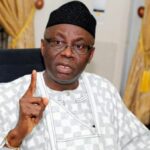I have reached the ripe old age of 70 in a country where life expectancy is just 56 years. I am most grateful to God for sparing and nurturing me up to this point. Very few of us make it this far. For my 70th birthday celebration, friends, relations, school mates and well-wishers organised a symposium to mark the event and I feel honoured for the friendship and respect shown to me. I am most grateful to His Highness, the Emir of Kano, Muhammad Sanusi II, for coming to chair the occasion in-person, His Eminence, Cardinal Onaiyekan, My Lord Bishop of Sokoto, Hassan Kukah, and the indefatigable chair of the planning committee, Dr Kole Shettima, for the honour. The word limit allowed for this column would not take the long list of friends, scholars, activists, civil society colleagues and relations that turned up to participate in the symposium and celebrations. I thank them all. My family, nuclear and extended, have also been wonderful pillars of support.
Themes addressed in the symposium covered what it means to be a progressive today and the state of the left movement in Nigeria, women’s human rights, electoral democracy, peace and conflict-resolution and identity politics in Nigeria. My good friend, Dr Yusuf Bangura, gave an excellent introduction to the core of my scholarly publications while the keynote speaker, Dr Abubakar Siddique Mohammed, spoke about my life. They were so kind in the words they spoke that I felt overwhelmed by the accolades.
My media friends at Premium Times and Trust newspapers made a splash in my honour and Charles Aniagolu had me on his programme on ARISE TV to speak to my life and the symposium. I learnt one thing from the event. When many people are praising you, you begin to feel that you are the greatest asset on earth since the invention of sliced bread. The outcome could be an escalation of self-centredness, pride and arrogance. I will henceforth avoid such situations so that I can maintain my sanity. The interlude is over.
- Corruption has brought Nigeria to its knees – ICPC
- Nigeria ready to chair Euro-African Dialogue on Migration — FG
For my part, I presented some of my publications at the occasion. They are as follows:
- Family, Identity, School, State: A Memoir by Jibrin Ibrahim.
- Identity, Authoritarianism and Democracy: A Reader on Politics in Nigeria by Jibrin Ibrahim.
- Deepening Democracy in Nigeria: Politics and Governance by Jibrin Ibrahim
- Deepening Democracy in Nigeria: Political Economy and Plural Society by Jibrin Ibrahim
- Christianity and Democracy in Nigeria, edited by Prof. Jibrin Ibrahim
- Christianity and Democracy in Nigeria: The Churches, edited by Prof. Ogoh Alubo
- Christianity and Democracy in Nigeria: Church Leaders, edited by Prof. Matthews Ojo
I would talk very briefly about the memoire only. It addresses my history and family, reflections about identity issues, the schools that I was trained in and some of my views about state and society. The first chapter tells the story of the conversion of my parents from Islam to Christianity in the late 1920s in Kano and Zaria respectively by the Church Missionary Society evangelist Walter Miller and his sister, Ethel Miller. After tracing the narrative, I also draw a family tree.
My introduction to wider Nigerian society and other religions happened in secondary school which had a significant impact on my upbringing. My school, Barewa College, drew students from all the provinces in northern Nigeria and was designed to promote a sense of unity and togetherness among students of different ethnicities and religions. It was also a school that was established to groom leadership for northern Nigeria. This point might however be truer of the earlier phase of its history as the school has lost some of its leadership gloss.
I next offer my reflections over the national pledge to provide free and qualitative education to all Nigerians born from 1970, the year the Nigerian civil war ended. The hope was that education would have a positive impact on social upliftment and creation of opportunities for the people as the best route to promote social cohesion and peaceful relations. I express my regrets that this pledge was not kept and the consequences for the nation have been the spread of social upheavals, ethno-religious conflicts, insurgencies, rural banditry and mass kidnapping. I remain convinced that investment in education for all is the best pathway to social and economic development.
Not surprising, I recognise the leadership qualities of 90-year-old General Yakubu Gowon who introduced the national pledge of universal primary education and played a key role in ensuring Nigeria survived the civil war of 1967-1970. His restructuring of Nigeria’s regionalism through the creation of states was a key moment in addressing the challenges that led to the collapse of the First Republic and the eruption of the civil war.
I also address the crisis that has befallen Nigeria’s education system. There has been a steady decline in the quality of education in the country creating two disturbing tendencies. The first is the decline in the quality of education in public institutions due to the decline of investment and the demographic explosion that led to a massive expansion of enrolment. The second has been the rise of private education that impacts children from poorer families that can today no longer aspire to quality education. This evolution has intensified the way in which Nigerian society is tearing at the seams.
The overall impact of these processes has been the crisis in the university system which has also been in steep decline. Investments in tertiary education have gone down dramatically. What has been even more dramatic is the erosion of the constitutional principle of education as a public good. The constitutional principle that government should provide free and qualitative educational, health and other social services has been ignored for decades and successive governments appear to have abandoned the constitutional directive that the purpose of government is to provide for the welfare and security of Nigerians.
The attempt by the Academic Staff Union of Universities to force the government back to investment in education as a public good has not produced the positive result expected. In fact, frequent strikes have weakened the university system and accelerated decline. As is the case with other institutions in the country, corruption within the academy is accelerating the decline of tertiary education. I conclude with proposals that could place the university system back on the path to recovery.
 Join Daily Trust WhatsApp Community For Quick Access To News and Happenings Around You.
Join Daily Trust WhatsApp Community For Quick Access To News and Happenings Around You.

